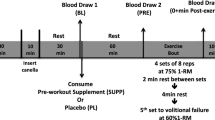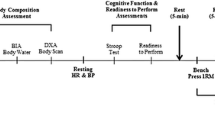Abstract
The effects of a recovery drink on overreaching induced by high frequency, high power resistance exercise was assessed. Resistance trained men were assigned to a supplemented (SUP, n = 8), placebo (PL, n = 3) or control (CON, n = 6) groups. All groups completed two weeks of familiarization training using the barbell squat. In week three, SUP and PL performed ten sets of five repetitions of speed squats twice daily, for a total of 15 training sessions. CON maintained their prior training schedule. Data were collected before week three (T1), after week three (T2) and after a week of recovery by training cessation (T3). During week three, SUP consumed an amino acid, carbohydrate and creatine monohydrate containing recovery drink immediately after each training bout. PL was provided a drink of similar appearance and taste but containing minimal nutritional value. At T2, both SUP and PL decreased mean squat velocity and power at 70% 1RM. Additionally, SUP and PL decreased muscle β2-adrenergic receptor (β2-AR) expression by 61 and 83%, respectively. Increases in the ratio of nocturnal urinary epinephrine/β2-AR ratio (EPI: β2AR) for SUP and PL suggested impaired sympathetic nervous system sensitivity. SUP demonstrated a smaller decrease in β2-AR expression and a lower EPI: β2AR, suggesting the recovery drink attenuated the detrimental effects of overreaching on the sympathetic activity. In conclusion, high power resistance exercise overreaching can induce performance decrements and impair sympathetic activity, but these effects may be attenuated by supplementation.
Similar content being viewed by others
References
Meeusen, R. et al., Prevention, diagnosis, and treatment of the overtraining syndrome: Joint consensus statement of the European College of Sport Science and the American College of Sports Medicine, Med. Sci. Sports Exercise, 2013, vol. 45, no. 1, p. 186.
Lehmann, M., Foster, C., and Keul, J., Overtraining in endurance athletes: A brief review, Med. Sci. Sports Exercise, 1993, vol. 25, no. 7, p. 854.
Fry, A.C. et al., Performance decrements with highintensity resistance exercise overtraining, Med. Sci. Sports Exercise, 1994, vol. 26, no. 9, p. 1165.
Fry, A.C. et al., Beta2-Adrenergic receptor downregulation and performance decrements during high-intensity resistance exercise overtraining, J. Appl. Physiol., 2006, vol. 101, no. 6, p. 1664.
Moore, C.A. and Fry, A.C., Nonfunctional overreaching during off-season training for skill position players in collegiate American football, J. Strength Cond. Res., 2007, vol. 21, no. 3, p. 793.
Lehmann, M., et al., Training-overtraining: Performance, and hormone levels, after a defined increase in training volume versus intensity in experienced middle and long-distance runners, Br. J. Sports Med., 1992, vol. 26, no. 4, p. 233.
Lehmann, M. et al., Autonomic imbalance hypothesis and overtraining syndrome, Med. Sci. Sports Exercise, 1998, vol. 30, no. 7, p. 1140.
Andersson, D.C. et al., Stress-induced increase in skeletal muscle force requires protein kinase A phosphorylation of the ryanodine receptor, J. Physiol., 2012, vol. 590, no. 24, p. 6381.
Cairns, S.P. and Dulhunty, A.F., The effects of betaadrenoceptor activation on contraction in isolated fastand slow-twitch skeletal muscle fibres of the rat, Br. J. Pharmacol., 1993, vol. 110, no. 3, p. 1133.
Murphy, R.J. et al., Chronic beta-blockade increases skeletal muscle beta adrenergic-receptor density and enhances contractile force, J. Appl. Physiol., 1997, vol. 83, no. 2, p. 459.
Williams, J.H. and Barnes, W.S., The positive inotropic effect of epinephrine on skeletal muscle: A brief review, Muscle Nerve, 1989, vol. 12, no. 12, p. 968.
Fry, A.C., Kraemer, W.J., and Ramsey, L.T., Pituitaryadrenal-gonadal responses to high-intensity resistance exercise overtraining, J. Appl. Physiol., 1998, vol. 85, no. 6, p. 2352.
Hakkinen, K. et al., Relationships between training volume, physical performance capacity, and serum hormone concentrations during prolonged training in elite weight lifters, Int. J. Sports Med., 1987, vol. 8, no. 1, p. 61.
Kraemer, W.J. et al., The effects of amino acid supplementation on hormonal responses to resistance training overreaching, Metabolism, 2006, vol. 55, no. 3, p. 282.
Ratamess, N.A. et al., The effects of amino acid supplementation on muscular performance during resistance training overreaching, J. Strength Cond. Res., 2003, vol. 17, no. 2, p. 250.
Sharp, C.P. and Pearson, D.R., Amino acid supplements and recovery from high intensity resistance training, J. Strength Cond. Res., 2010, vol. 24, no. 4, p. 1125.
Halson, S.L. et al., Effects of carbohydrate supplementation on performance and carbohydrate oxidation after intensified cycling training, J. Appl. Physiol., 2004, vol. 97, no. 4, p. 1245.
Achten, J. et al., Higher dietary carbohydrate content during intensified running training results in better maintenance of performance and mood state, J. Appl. Physiol., 2004, vol. 96, no. 4, p. 1331.
Kraemer, W.J., Ratamess, N.A., and French, D.N., Strength training: Development and evaluation of methodology, in Physiological Assessment of Human Fitness, Maud, P.J. and Foster, C., Eds., Human Kinetics: Champaign, IL, 2006, p. 119.
Evans, W.J., Phinney, S.D., and Young, V.R., Suction applied to a muscle biopsy maximizes sample size, Med. Sci. Sports Exercise, 1982, vol. 14, no. 1, p. 101.
Staron, R.S. and Hikida, R.S., Histochemical, biochemical, and ultrastructural analyses of single human muscle fibers, with special reference to the C-fiber population, J. Histochem. Cytochem., 1992, vol. 40, no. 4, p. 563.
Fry, A.C. et al., Catecholamine responses to shortterm high-intensity resistance exercise overtraining, J. Appl. Physiol., 1994, vol. 77, no. 2, p. 941.
Lehmann, M. et al., Decreased nocturnal catecholamine excretion: Parameter for an overtraining syndrome in athletes?, Int. J. Sports Med., 1992, vol. 13, no. 3, p. 236.
Raastad, T. et al., Changes in human skeletal muscle contractility and hormone status during 2 weeks of heavy strength training, Eur. J. Appl. Physiol., 2001, vol. 84, nos. 1–2, p. 54.
Gagnon, A.W., Kallal, L., and Benovic, J.L., Role of clathrin-mediated endocytosis in agonist-induced down-regulation of the beta2-adrenergic receptor, J. Biol. Chem., 1998, vol. 273, no. 12, p. 6976.
Vasudevan, N.T. et al., Regulation of beta-adrenergic receptor function: An emphasis on receptor resensitization, Cell Cycle, 2011, vol. 10, no. 21, p. 3684.
Jost, J., Weiss, M., and Weicker, H., Sympathoadrenergic regulation and the adrenoceptor system, J. Appl. Physiol., 1990, vol. 68, no. 3, p. 897.
Izawa, T. et al., Beta-adrenergic receptor adaptation after an acute exercise in rat myocardium, Jpn. J. Physiol., 1989, vol. 39, no. 3, p. 447.
Nieto, J.L. et al., Adaptations of the beta-adrenoceptor- adenylyl cyclase system in rat skeletal muscle to endurance physical training, Pfluegers Arch., 1997, vol. 434, no. 6, p. 809.
Sato, S. et al., Synthesized glucocorticoid, dexamethasone regulates the expressions of beta(2)-adrenoceptor and glucocorticoid receptor mRNAs but not proteins in slow-twitch soleus muscle of rats, J. Toxicol. Sci., 2011, vol. 36, no. 4, p. 479.
Hakkinen, K. and Pakarinen, A., Serum hormones in male strength athletes during intensive short term strength training, Eur. J. Appl. Physiol. Occup. Physiol., 1991, vol. 63, nos. 3–4, p. 194.
Fry, A.C. et al., Endocrine responses to overreaching before and after 1 year of weightlifting, Can. J. Appl. Physiol., 1994, vol. 19, no. 4, p. 400.
Hakkinen, K. et al., Serum hormone concentrations during prolonged training in elite endurance-trained and strength-trained athletes, Eur. J. Appl. Physiol. Occup. Physiol., 1989, vol. 59, no. 3, p. 233.
Haff, G.G. et al., Carbohydrate supplementation and resistance training, J. Strength Cond. Res., 2003, vol. 17, no. 1, p. 187.
Philp, A., Hargreaves, M., and Baar, K., More than a store: Regulatory roles for glycogen in skeletal muscle adaptation to exercise, Am. J. Physiol.: Endocrinol. Metab., 2012, vol. 302, no. 11, p. e1343.
Steensberg, A. et al., Muscle glycogen content and glucose uptake during exercise in humans: Influence of prior exercise and dietary manipulation, J. Physiol., 2002, vol. 541, p. 273.
Gulick, T. et al., Interleukin 1 and tumor necrosis factor inhibit cardiac myocyte beta-adrenergic responsiveness, Proc. Natl. Acad. Sci. U. S. A., 1989, vol. 86, no. 17, p. 6753.
Deminice, R. et al., Effects of creatine supplementation on oxidative stress and inflammatory markers after repeated-sprint exercise in humans, Nutrition, 2013, vol. 29, no. 9, p. 1127.
Stefani, G.P. et al., Effects of creatine supplementation associated with resistance training on oxidative stress in different tissues of rats, J. Int. Soc. Sports Nutr., 2014, vol. 11, no. 1, p. 11.
Author information
Authors and Affiliations
Corresponding author
Additional information
Original Russian Text © A.J. Sterczala, A.C. Fry, L.Z.F. Chiu, B.K. Schilling, L.W. Weiss, J.X. Nicoll, 2017, published in Fiziologiya Cheloveka, 2017, Vol. 43, No. 4, pp. 103–113.
The article is published in the original.
Rights and permissions
About this article
Cite this article
Sterczala, A.J., Fry, A.C., Chiu, L.Z.F. et al. β2-adrenergic receptor maladaptations to high power resistance exercise overreaching. Hum Physiol 43, 446–454 (2017). https://doi.org/10.1134/S0362119717040144
Received:
Published:
Issue Date:
DOI: https://doi.org/10.1134/S0362119717040144




